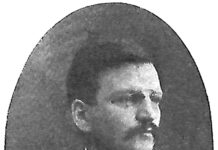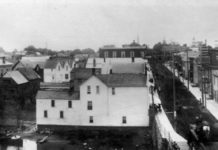In 1901, reports began to appear in Toronto newspapers that G. H. Ferguson, Reeve of the little village of Kemptville, intended to run in the next provincial election, preferably as the Conservative candidate, but, if not, as an Independent. Ferguson’s own newspaper in Kemptville denied he had any intention of ever running as an Independent, and that he “is not dividing the Conservative Party”. Only one of those two statements proved to be true. It was not surprising that he would set his sights higher than Kemptville politics. After winning five elections, becoming Reeve for three straight years (elections then were held annually), he had a solid record of achievement to present to voters on a wider stage. New bridges, paved roads, a library, and the purchase of Riverside Park from the Township of Oxford-on-Rideau had all added to the stature of both Kemptville and its Reeve.
The strange move was to run provincially, rather than federally. After all, his father, Dr. Charles Ferguson, had been the local Member of Parliament for over twenty years, and it seemed logical that Howard would follow in his footsteps. But the sitting M.P. was a friend of the family, a very popular figure, and impossible to unseat. That left provincial politics. But there was a sitting M.P.P. as well, a Conservative to boot, one Robert Joynt was a merchant from Augusta Township who had been the member for Grenville since 1898 and had no intention of stepping aside for the young upstart. This would take tact and patience, two traits Howard singularly lacked.
Although he had announced his intention of running for Reeve again, he withdrew and entered the nomination meeting on May 7, 1902. But it was too soon, and Joynt won the nomination with 54 votes to Howard’s 36. During the ensuing campaign, Howard campaigned alongside Joynt in Kemptville, and the Conservatives won the seat, as always, with the biggest majority achieved to date, 860 votes ahead of the hapless Liberals. Joynt may have thought he was safe for another few years at least, but circumstances worked against him. The Liberal government at Queen’s Park was running out of steam after thirty-five years in power, and a nother election was expected sooner rather than later. This may explain why Joynt launched an amazing and foolish attack on Howard Ferguson at a Grenville Conservative Association meeting in Spencerville in October, 1903.
Joynt accused Ferguson of reaching out to the Liberals in the previous election to gain their support as their party’s candidate to run against Joynt. He cited the testimony of three leading Liberals in support of his explosive claims. By the end of the month, the Ferguson camp had sworn statements from all three Liberals cited denying that any such approach had been made to them by Howard, and completely destroying Joynt’s claims and reputation. Howard’s supporters then moved to have a nomination meeting to select candidates for both provincial and federal elections, even though Joynt had only been elected eighteen months earlier. Despite Joynt’s strenuous objections, the meeting went ahead in Spencerville on December 8, and Joynt, deeply angry at this rather underhanded political chicanery, refused to stand for re-selection and Howard won the nomination unopposed.
This was not the end of the matter. Joynt then spent the time before the next election claiming to all and sundry that Howard Ferguson had bought the nomination by paying delegates $10 each for their vote, the kind of accusation he would face for his entire political career. Howard Ferguson was quite aware of his reputation as a political operator, less than squeaky clean, and at a meeting in Kemptville, when he referred to Liberal skullduggery, the crowd of friends and neighbours began to snicker. Howard noticed the reaction and said: “When I come to speak of public morality, you think I am joking. Well, don’t do as I do, do as I say.”
To appear fair, Howard agreed to another nomination meeting once a provincial election had been called, and in January, 1905, once again in Spencerville, he defeated Joynt’s attempt at a comeback by a slim majority. Joynt was not to go silently and issued an open letter accusing Howard, once again, of irregularities in the choice of nominating delegates, particularly those from Burritt’s Rapids. It seems it took the personal intervention of their party leader, James Whitney, to get Joynt to desist.
In the event, the 1905 election saw Howard Ferguson elected as the new M.P.P. for Grenville County, and Whitney’s Conservatives assuming office as the new government of Ontario. Howard’s timing was excellent. He was now a government backbencher in the Legislature, although it would be another six years before he made a name for himself outside that chamber, and then it would be in a very public and controversial manner. Not that he was silent in his first years in Queen’s Park, where his specific set of skills provd very useful to the Premier and gave Howard his reputation as the “Tory Hatchet Man”.








